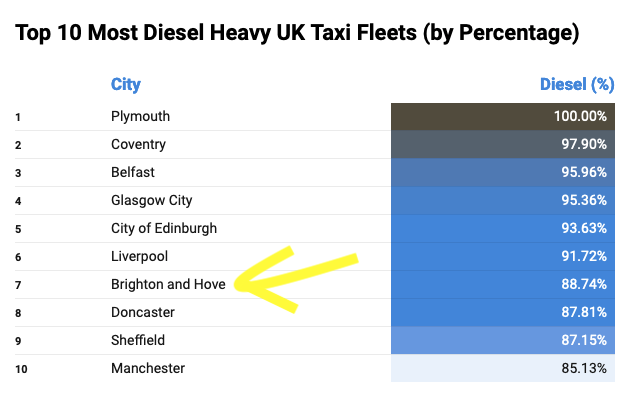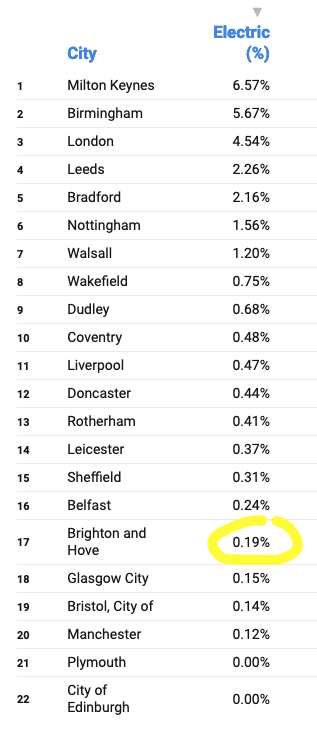- Previous: SCA Extension - Question Posed at ETS meeting on 17th of January 2023
- Next: The Necessary Interventions to Improve Air Quality - Local Election 2023
Is it Time for Clean Air Taxi Incentives?
Written by Adrian Hill
23% of all the taxis in our city are of the age, manufacturer and fuel type (diesel) associated with the VW emissions scandal. As a result, these vehicles are much more likely to emit more pollution than other vehicles. The more pollution we are exposed to, the more damage it will do to our health. Even though these vehicles may be newer and have the euro 6 standard stamp of approval, they will likely perform worse than intended; these vehicles are defective.
The good news is that owners who have been mis-sold these poorly performing vehicles can claim large amounts of money back from the manufacturer. The manufacturers agreed to settle a group claim and pay compensation to the owners of these vehicles. Almost £200 million has already been paid out. If a product causes harm we cannot reasonably expect the product to remain in use, especially when those who are harmed by the defective product are not able to avoid the harm. This is a shame for both those exposed to poor air quality and the drivers but the drivers have accepted a compensation settlement. Some recent studies have shown that somewhere between a third and a half of all childhood asthma cases in cities are caused by being exposed to high levels of pollution. It is absolutely vital to improve the air quality.
Taxi drivers on average drive around 20,000 miles per year with some reaching up to 40,000. Those miles will usually be driven inside the city right next to the places where we spend long periods of time. These locations, where we spend the majority of our time, are the areas that we need to concentrate on most in order to clean up our environment. Vehicles that fail emission testing shouldn't be driven next to our schools, bus stops, hospitals, doctor's surgeries, pharmacies, homes and parks.
Some european countries have banned these vehicles in parts of their cities. They deemed the harm they cause unacceptable. However I feel our city will continue to be slow to react to the health harm these vehicles cause. While we continue to wake up to our slow acknowledgement these vehicles do cause us ill health, in the meantime, I feel we should at least provide incentives to drivers to clean up these vehicles. Grants and reduced licence fees for cleaner vehicles could easily be rolled out by our local council.
In Cambridge (and other cities), the incentives are provided by cheaper license fees. The different categories being electric, euro 6 and older vehicles. To preserve council financial accounts, when reducing license fees, some of the lost revenue could be switched to those with older vehicles. Cambridge actually offers their electric vehicle licenses for free. It is my opinion we could do this in Brighton & Hove right now.
The council could go further still by awarding grants to upgrade vehicles. In fact Uber corporation help drivers save money for vehicle upgrades by automatically creating a savings pot by taking a small percentage from their taxi fares.
Taxi drivers are exposed to some of the highest levels of pollution of all city workers because they spend hours in traffic, waiting regularly at taxi ranks near idling engines and rarely spend time away from these polluted environments. When talking about cleaning up the air we often talk about protecting the most vulnerable such as children, the elderly and those with existing health conditions. However it is also important to think about reducing the exposures of those who likely breathe in the most pollution; taxi drivers themselves.
Bus operators have been forced to upgrade their fleet due to the ULEZ on North Street and Western Road. The ULEZ applies to only buses with taxis unaffected. Many of the upgrades to the bus fleets will have been paid for by passenger fares. If the poorest and more efficient transport users can afford to upgrade to cleaner vehicles and taxi drivers in other cities (and countries) continue to upgrade at a faster rate, surely it is time to introduce some incentives as a matter of priority.
Air pollution causes significant ill health to tens of thousands of Brighton & Hove residents and it is time we took the steps to improve lives. People should walk, cycle, e-cycle, take a train or possibly a bus to get around the city but, now that drivers have settled on compensation, the remaining taxis still in demand inthe city should be upgraded as quickly as possible to avoid causing any more harm to the drivers themselves and those others around the city.

